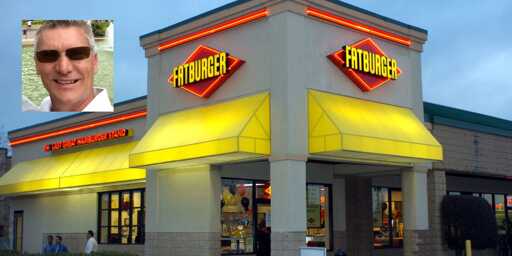They really offered 2 possible outcomes:
- Increase prices
- Fire people
Why not just . . . make less money?
The increase was $4. The article kept using percentages to make it seem like some big scary change, but the increase is 1 meal per hour per worker. I’m pretty sure any half decent restaurant can handle that extra $4 per worker hourly.
But no, the solution is clearly to just nuke your vacation policy so you can save $1000 per worker per year. Yeah okay.
American notions of profit and loss are fucked up.
It doesn’t matter if you’re profitable. Let me say that again. It does not matter if you’re profitable.
You have to be making MORE profit than you did same time last year, last quarter, last month.
If you don’t keep making more profit, you are somehow “losing money”. Money that’s “rightfully owed” to you. Money that should and would have otherwise been yours.
And if you’re a publicly held company and you miss that profit goal, the stock market will PUNISH you.
Hell, you could make more profit and STILL get punished if you didn’t “beat expectations”.
That’s because investors only make money when the value goes up. The pressure to always make more money than before is baked into the public ownership system we created. I think we should make all companies employee owned instead of investor owned and then you’d fix the broken incentive structure.
You bring up a great point. Once I applied for a mortgage and showed that I had a part time job and a small business. I had made some changes in my financial structure so it looked like on paper that year my company was failing even tho personally I made more money consistently over the years. Didn’t matter, my loan got rejected cuz technically the business was making less money.
Can you link to someone or some document or something that exhibits this point of view?
I think this is neat. I prompted chatGPT-4 with your question about the above comment. This was the result:
Your perspective on the issues with the current focus on continual profit growth in American businesses is indeed echoed in various discussions and criticisms in the business and academic world.
A significant point of critique is the heavy emphasis on shareholder value, often at the expense of other stakeholders. This shareholder-centric view has been dominant for some time, with the primary objective seen as maximizing profits for shareholders. However, this perspective often disregards the broader responsibilities and long-term vision of companies. Recently, there has been a shift towards “stakeholder capitalism,” where companies are increasingly recognizing the importance of considering the interests of all stakeholders, including society at large, and not just focusing on short-term financial performance. This approach aims to foster a more sustainable balance between short-term pressures and long-term value creation, and helps restore trust in companies as vital contributors to society [❞].
The pursuit of continual growth and the pressure to exceed previous profit margins has also been critiqued for leading to other detrimental effects. For instance, unchecked business growth can result in increased workload, higher competition, a deviation from the original business vision, lower-quality customer relationships, and faster team member turnover. These factors can contribute to a loss of the unique qualities that made a business successful in the first place and may ultimately lead to less success in the long term [❞].
Furthermore, in the realm of stock prices and corporate valuation, the relationship between growth expectations and stock performance is more complex than often portrayed. Research suggests that growth expectations might have less impact on asset prices than traditional models suggest. This indicates that the market’s demand doesn’t react strongly to changes in expected returns, challenging the common belief that consistently higher profits directly lead to higher stock prices [❞].
These critiques highlight the complexities and potential pitfalls of the current American business model, which prioritizes constant profit growth and shareholder value, often at the expense of broader, long-term goals and responsibilities.
You know how I know it hallucinated part of that answer? It said companies are now considering their affect on society. Lol yeah, ok.
They claim to do that every few years, just to get a percentage of angry folks to quiet back down a bit.
1 meal per hour per worker
Fat Burger in LA is charging $17.29 for their most basic meal. That comes out to one extra meal per hour, per every 4 employees.
That franchise owner is really just a cheapskate asshole.
deleted by creator
You can look at his picture and the background to get a sense of the REAL problem.
He should try pulling harder on his bootstraps.
And cut out the avocado toast.
That’s what he’s doing though isn’t he?
He’s mistaking the bootstraps of his workers for his own.
Where does the owners say that the owner is making sacrifices? I read the article, but the title actually tells most of it, for once: I’m a California restaurant operator preparing for the $20-an-hour fast-food wage by trimming hours, eliminating employee vacation, and raising menu prices.
Nothing in there about the owner trying harder or making sacrifices, just passing the cost to his workers (eliminating PTO) or customers (increasing menu prices). Who knows, maybe he is…but the article does not say it.
He’s pulling himself up by the bootstraps, how he’s doing it is irelevant.
I like how you said “the bootstraps” because it sure ain’t his bootstraps that he’s pulling lol
How much you think there is to tighten? Restaurants run on thin margins. Let’s play with numbers.
Say this guy profits $1,000,000/yr., ALL profit. And he gives up every penny of that to make payroll. Let’s say his labor and risk are worth nothing. I’m OK with that. Hell, you’re lucky to take a loss, for years, starting a business, let alone break even.
At $20/hr., that’s 50,000 manhours he can employ. But not really. An employee pocketing $20 probably costs his employer $40. OK, 25,000 manhours. That’s about 480 hours of work per week he’s able to use. So 12 employees? Spread over 4 restaurants?
And notice the part where he said $20 was rock-bottom? And higher-level employees will need more to keep them on?
So instead of saying fuck it and pulling the plug and selling his assets, he’s trying to tighten up, keep those people on the payroll. And gets demonized for it.
Thank you for coming to my TED Talk. In our next Talk we’ll be bitching about sky-high fast-food prices.
tl;dr: Y’all seeing billionaires and megacorps raiding the economy and conflating them with guys like this.
IIT: Buncha people who have never worked payroll and have no clue how it works.
If he had left it at “I’m raising prices”, then no one would have an issue with what he said.
The rest of it is just him being a giant asshole
Everyone except dumbasses with no critical thinking skills understands that in order to pay people a living wage, prices have to adjust accordingly
You have just calculated that he can hire 12 more people from the current profits (with made up numbers). That’s not what’s in question here. He’s already got the people and needs to pay them marginally more.
Your numbers are wildly off. The raise amounts to 4$, your going from 20$ and jumping to 40$ is irrelevant because the employees are already employees, the only cost increase here is the 4$ extra per hour.
So you’re looking at closer to 200k manhours based off your calculations or around 100 employees.
He runs 4 restaurants, and with that million dollars in profit he could cover the raises of 100 employees, and I highly highly doubt he’s running anywhere near 25 employees per restaurant.
If a business cannot survive paying its employees a liveable wage then it should not exist. Businesses that do not pay a livable wage but can afford to are exploiting its employees.
Imagine thinking the employees are the entitled ones when running a business and feeling entitled to their labor at your price.
I’m sorry, who’s the entitled one? Those businesses should 100% not exist. It’s called having a shitty business model.
I hear this all the time but the reality is probably a third of us work at places that are barely surviving. Imagine if all of those people were suddenly unemployed.
If companies stealing the value of people’s labor shut down, opening the way for new employee owned companies, that would be fantastic
This is great in theory but there are plenty of companies that struggle to succeed in the current realities of real estate costs, labor costs, regulatory compliance expenses etc. Not every organization has people leeching all of the profits, and even many good ones are struggling to stay afloat right now. Just because a company is employee owned doesn’t guarantee profits to share.
Mark owns fatburger franchises and he and his family are BARELY scraping by… They only took two European vacations last year and their kid that just turned 16 had to get a tesla instead of electric Porsche? It’s just not sustainable and this ASSAULT needs to stop or hard working vampires like Mark and his loved ones suffer.
Edit: oh, that’s weird… Autocorrect formed “families” into “vampires”.
I think it works
Fuck Door Dash.
These assholes ripped me off for over $90 dollars.
Then their automated system called me and woke me up at 1:30 am to ask me about my customer service experience.
I would drink poison before I ever did business with these shit sucking assholes again.
Lol, 48 hours of paid time off. I don’t even work full time and get 120 hours, by law. Fuck the US.
Do you mind sharing roughly where that is? Obviously don’t dox yourself completely lol
I’ve been at my company for 7 years this August and will just now hit that 120 hours vacation time, naturally just as I’m looking to quit lol
Companies here start at 0 hours vacation for the first year, and then slightly increase it for the 2nd year. I’m considered “lucky” for the time I get now…
In civilized nations 120 hours would be far below the legal minimum for a full time position. Here in the Netherlands the legal minimum is 4 weeks (20 days or 160 hours) but pretty much every company offers at least 25.
In a previous job I had 57 paid days off.
Australia has 20 days annual leave for full time employees mandated by law, and it carries over year on year so you can build up a significant chunk of time if you work somewhere for a long time. Also those hours belong to you, not the company, so you get it paid out if you quit.
We also have a Long Service Leave program where if you work somewhere for 7 year you get roughly a week off for every year of employment with a company, it does vary slightly state by state.
The construction industry has made an arrangment that as long as you are working construction in some way, your long service leave entitlement carry over between employers and jobs.Lot of companies also add carers leave on top of this, which may not carry over year on year, and sick leave can be fairly variable between everywhere I’ve ever worked has been pretty casual about it, if you call in sick a day here or there then they don’t hassle you, but for longer periods you might need a doctor’s certificate.
It’s pretty good.
eliminating employee vacation
Man shut the fuck up, the only employee that got a vacation was you numbnuts
Walberg said he used to offer paid time off to eligible workers. The average worker earned about 48 hours of paid time off, capped at 72 hours a year, he said.
Jesus fucking Christ. Shit like that has been illegal for a century where I live
“Eliminating employee vacation”
His workers had an average 48 hours of yearly vacation time. That is not vacation time.
What trash
I’m shocked they had any vacation time at all! I’ve never heard of anyone in the food industry (besides managers) that get any PTO. I’m also surprised how much PTO they get! Teachers only get 40 hours a year.
At $20 that’s less than a thousand dollars a year.
Never once crossed his mind to take less from the top. American businesses should fail more often.
Something like 90% of restaraunts fail in 3 years or something like that. It’s a famously competitive industry.
The unfortunate thing here is that small businesses fail often, there should be improved regulations to prevent predatory capitalism so small one offs can thrive. But I lose my sympathy for a franchisee or corporation that can’t skim as much cream so the soulless bastards make life worse for the workers instead of taking a slightly smaller top cut.
Boohoo, a capitalist that owns 4 restaurants is passing the costs of labor on to their customers and is still blaming us for it. Sounds like the playbook of an abuser.
If paying people what they are worth causes businesses to fail, then that is just Daddy Capitalism working right?
For sure, record breaking profits never get passed on to the customer, if anything it pushes companies to see how much they can squeeze from nothing.
But hard times always fall on the customer.
Greed is evil.
In fact the opposite is often true, such as when Huggies Diapers recently cut production costs and raised prices several years in a row.
The older I get the more I think that capitalism is incompatible with a moral society. I dont know what could replace it, but chasing “profit” has caused so much harm to our society.
Imagine this guy, Marcus Walberg, having the sales volume that comes with operating 4 restaurants in LA and saying “doing business in California has never been more strained” LMFAO.
Sell the properties cheap, then, I’ll take a loan for that lot no problem! I’d open a Bakery that sells Yeast Donuts and my specialty Meal in a Focaccia (Vegan Options Available).
“how will I buy my next four franchises if I have to pay my employees a living wage?”
The new California law doesn’t apply to employees at full-service chains such as Chili’s or Cheesecake Factory.
That’s really strange. A minimum wage for just fast food?
That’s because they have a joke of a governor. They didn’t raise the minimum wage, just for fast food.
yeah fuck baby steps. and fuck the governor because other governors are doing better, right?
right?








